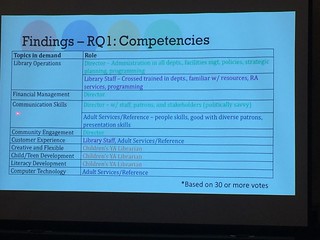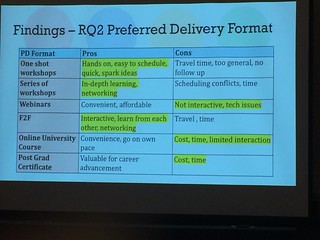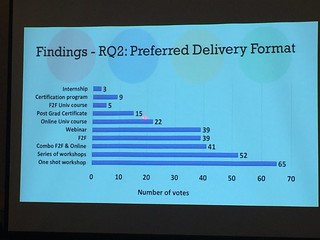Give me some slacks Public Librarians LINQ Together for Professional Development
Vanessa Irvin (presenter) and Wiebke Reile - University of Hawaii
LINQ is used on Hawaii
Inquiry-based professional development model for public librarianship
Incorporates online collaboration platforms for discourse
They use Slack.com, which is free and easy. Cloud-based which allows for a variety of different content to be incorporated. It can be real-time or asynchronous. Online collaboration platform. Conversations were in different topic channels.
A place to pose questions and have meaningful exchanges.
Librarians were about to share artifacts, including documents and photographs.
LINQ data in LIS 601
Sharing research data in the classroom
Hear what front line librarians are thinking, discussing, and sharing
Brings the wisdom of practitioners into the classroom
Disrupts the controlled environment of the classroom
Shows practitioners are experts
In using this data with their class last spring, LIS students wanted to ask a question in LINQ. Faculty facilitated the interaction.
Now some faculty are using Slack to teach their classes. There are private channels on Slack. She is using it for submitting assignments.
Faculty insights:
- Coursework becomes more collaborative
- Questions seem more welcomes as sites of inquiry and reflection
- Student output more
Role of LIS Schools in Continuing Education
Valerie Karno, Lauren Mandel, Mary Moen (presenter) - University of Rhodes Island
Background / Problem
CE a necessity as libraries transform
Challenge - identify competencies
Challenge - delivery formats
What is the role of an LIS program?
They did a qualitative study with focus groups
Data collection
1) Competencies gallery walk
2) Worksheet and consesogram about preferred delivery formats
Data analysis led to finding common themes on competencies.
Findings:



Role of LIS programs:
- One shot workshops or series
- Faculty expertise
- Pull from existing content
- Online courses
- Post graduate certificate
Considerations:
- Demand for interactive online learning - CE for faculty
- Workshops - faculty service or compensation
- Develop faculty expertise in identified topics or bring in others
- How do make sustained CE worth their time and money?
- How to competencies needed and format intersect?
Conclusions:
- Interest in CE
- Challenges application to all higher Ed
- Need to explore options
- As a public university, need to be accountable to the community
Learning by Doing: Using Field Experience to Promote Online Students’ Diversity Engagement and Professional Development
Denice Adkins (presenter), Jenny Bossaller (presenter), Beth Brendler, Sarah Buchanan (presenter), Heather Moulaison Sandy (presenter) - University of Missouri
Challenges:
- Lack of professional socialization for online students
- Lack of student diversity awareness
Solutions:
- Experiential learning
- Field experience
- Diversity focus
Kolb experiential learning theory - teaching and learning spiral
Theory feeds practice and practice feeds theory
Diversity - theories
- Contact theory - contact between different groups increases acceptance
- Inclusive excellence
- Diversity levers - social justice, human dignity, equity in access to information, equity in information preservation. Where in the LIS curriculum does this occurs naturally?
“Practicum in information agencies” is the one required course where this can occur.
This can also occur as a class assignment. Adkins and Buchanan walked through an example. Students worked with materials at the Black Archives of Mid-America during a fall course (2016) and then during spring break (2017).
Another way to put students in a diverse setting is through study abroad: South Africa, Ireland/UK, and St. Lucia. Students wrote reflections everyday on the trips, which helped them learn from the experience. Also did a service learning trip in Joplin, MO.
They also have a service learning class on community leadership.
The digital libraries class worked with the Cambio Center on a project.
They noted that they still have challenges. The tools that measure changes in beliefs about diversity are subjective and imprecise.
Final takeaways from the presenters:
- These are things that we can do, e.g., teaching with Slack
- Bring people of color into online discussions
- Have students lead in-Service training
- Good to see people trying new things
No comments:
Post a Comment